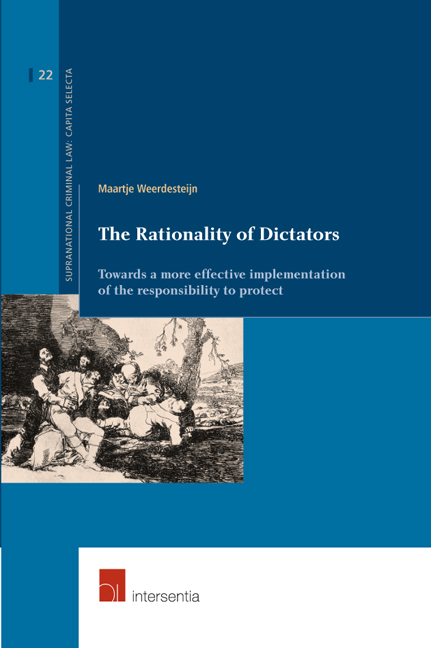 The Rationality of Dictators
The Rationality of Dictators Book contents
- Frontmatter
- Acknowledgements
- Contents
- Chapter 1 Introduction
- Part I The Theory
- Chapter 2 The World of the Dictator
- Chapter 3 Mass Atrocities and the Role of the Dictator
- Chapter 4 Preventing and Stopping Mass Atrocities: the Responsibility to Protect
- Chapter 5 The Interaction between States and Heads of State: the Role of Rationality
- Chapter 6 Different Kinds of Rationality: The Work of Max Weber
- Part II The Comparative Case Study
- References
Chapter 3 - Mass Atrocities and the Role of the Dictator
from Part I - The Theory
Published online by Cambridge University Press: 28 September 2018
- Frontmatter
- Acknowledgements
- Contents
- Chapter 1 Introduction
- Part I The Theory
- Chapter 2 The World of the Dictator
- Chapter 3 Mass Atrocities and the Role of the Dictator
- Chapter 4 Preventing and Stopping Mass Atrocities: the Responsibility to Protect
- Chapter 5 The Interaction between States and Heads of State: the Role of Rationality
- Chapter 6 Different Kinds of Rationality: The Work of Max Weber
- Part II The Comparative Case Study
- References
Summary
INTRODUCTION
In order to understand the causes of mass atrocities, a wide array of risk factors have been identified which are said to heighten the potential for mass violence. These factors range from structural societal factors like episodes of previous conflict and schisms in society to more immediate factors such as periods of economic or political crises and the level of democracy, or lack thereof (e.g. Harff, 2003; Staub, 2000, pp. 369-370; Woolf & Hulsizer, 2005). The latter point is of particular relevance to the present research. Many scholars have argued that dictatorial regimes and their leaders, especially if they profess an exclusionary ideology, are important for the perpetration of mass atrocities (Mandel, 2002, p. 262; Staub, 2000, p. 372; 2010, p. 174; Valentino, 2004; Woolf & Hulsizer, 2005, pp. 106-108). Surprisingly little research exists, however, on why this is so and how the dictator relates to the other factors that have been identified as important risk factors which enhance the possibility that mass atrocities occur (an exception is McLoughlin & Weerdesteijn, 2016). The current research on leaders who perpetrate mass atrocities therefore remains underdeveloped (McLoughlin & Weerdesteijn, 2016, p. 118; Padilla, Hogan, & Kaiser, 2007, p. 177; Woolf & Hulsizer, 2005, p. 107).
Mass atrocities are not only perpetrated in dictatorships, nor do all dictatorial regimes perpetrate atrocities, but the absence of an established democratic system of government heightens the risk mass atrocities will be perpetrated. Although some of these regimes will be merely unable to stop the perpetration of atrocities, frequently the dictatorial regime is orchestrating its perpetration. Dictatorial rule has led to horrible suffering and as Chirot notes, ‘[i]n some cases, it was error, the mistaken policies of rulers that produced such horrors. But more often than not, killing and suffering on a gigantic scale was started on purpose, to carry out specific political goals’ (Chirot, 1994, p. 9). These included either obtaining or solidifying power, or executing particular policy goals, once in power (Chirot, 1994, pp. 7-9; Woolf & Hulsizer, 2005, pp. 106-107). Valentino even goes as far as saying that generally,
‘mass killing will be best understood when the phenomenon is studied from what I call a strategic perspective. The strategic perspective suggests that mass killing ismost accurately viewed as an instrumental policy – a brutal strategy designed toaccomplish leaders’
- Type
- Chapter
- Information
- The Rationality of DictatorsTowards a more effective implementation of the responsibility to protect, pp. 55 - 74Publisher: IntersentiaPrint publication year: 2016


